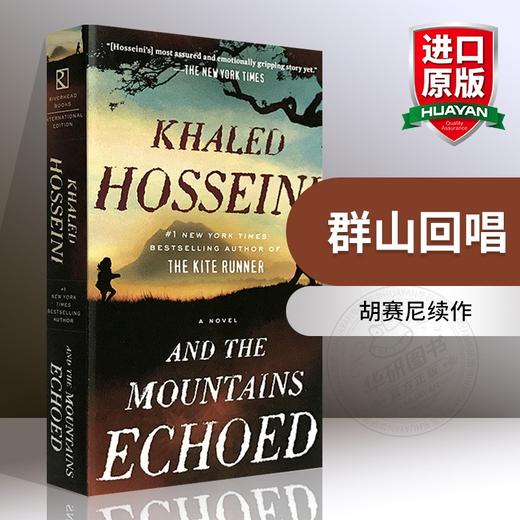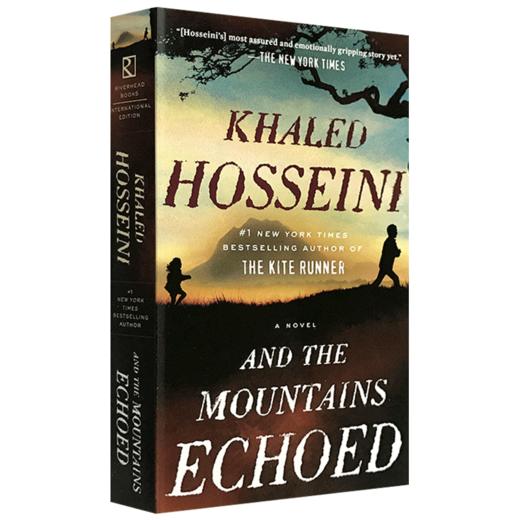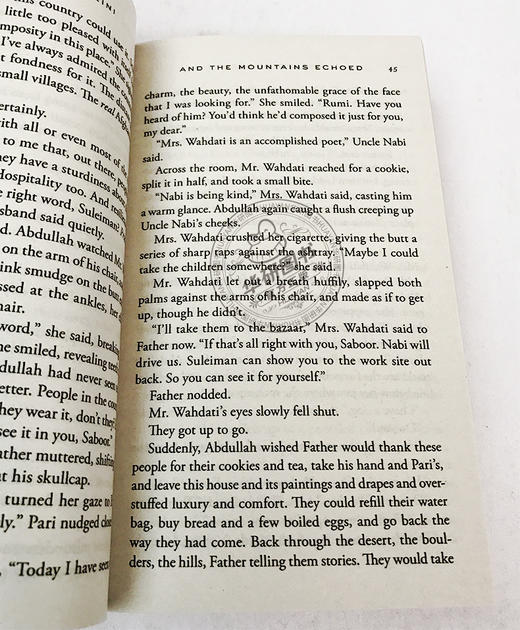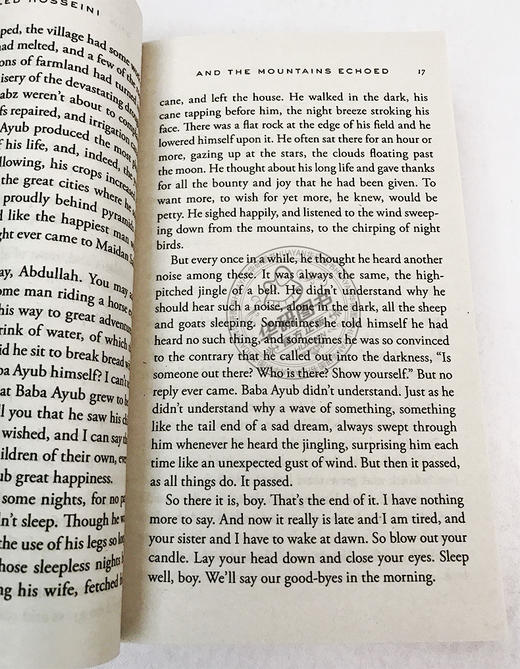群山回唱 英文原版小说 And the Mountains Echoed 英文版进口书 The Kite Runner追风筝的人作者胡赛尼续作
| 运费: | ¥ 0.00-999.00 |
| 库存: | 47 件 |
商品详情
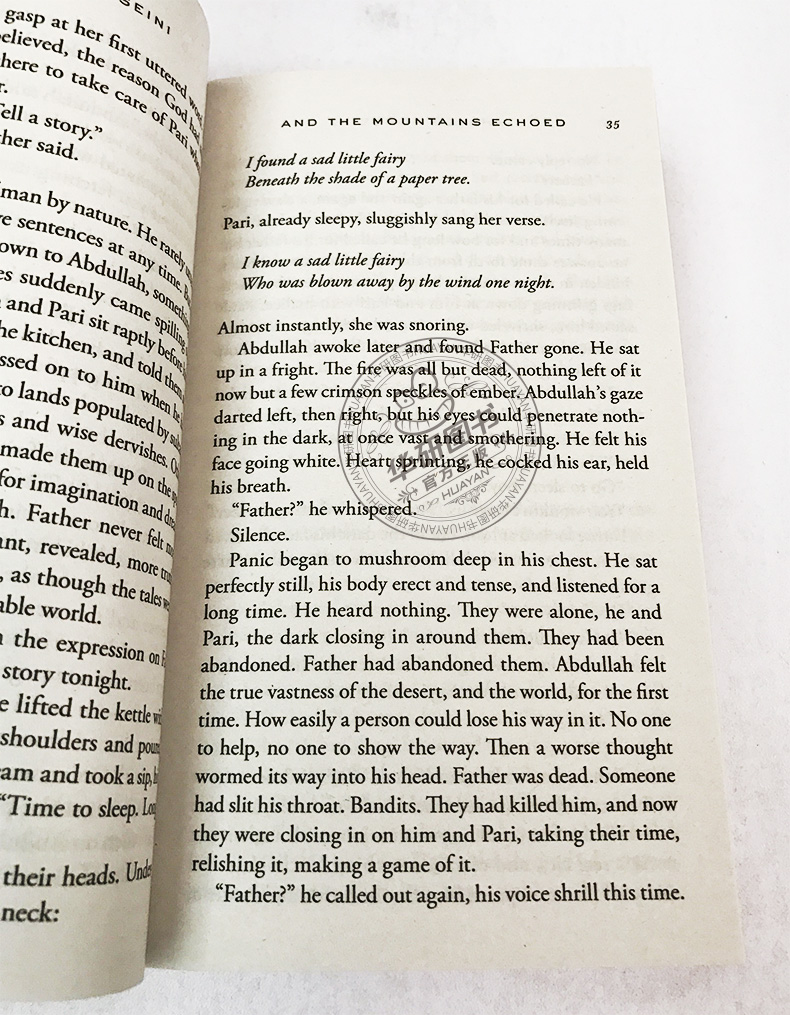
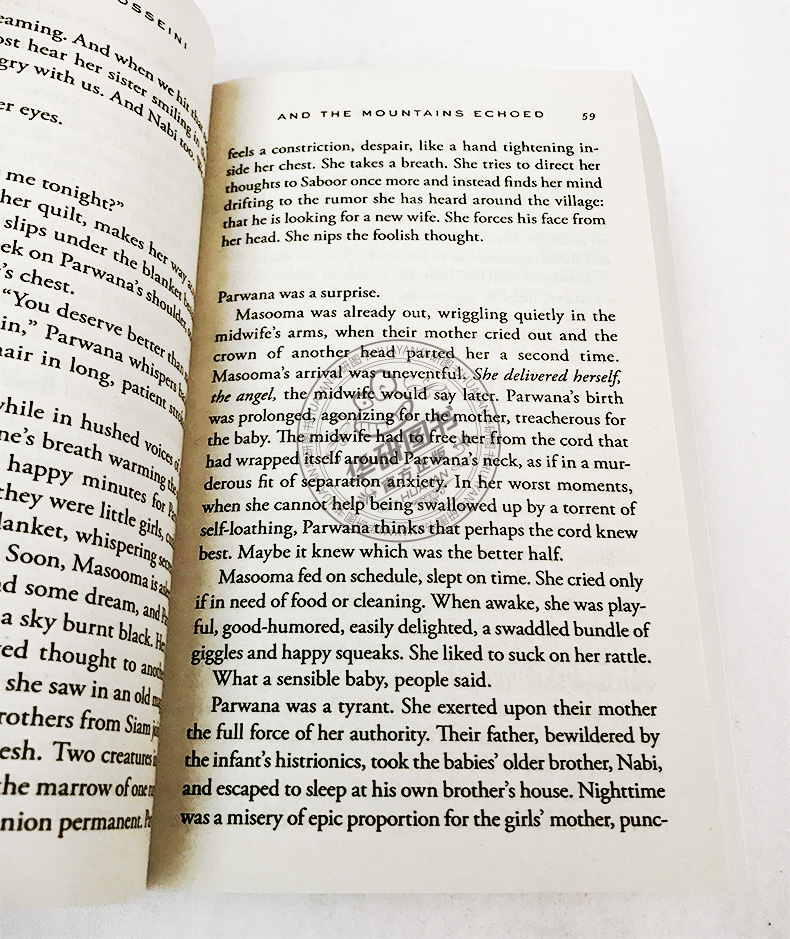
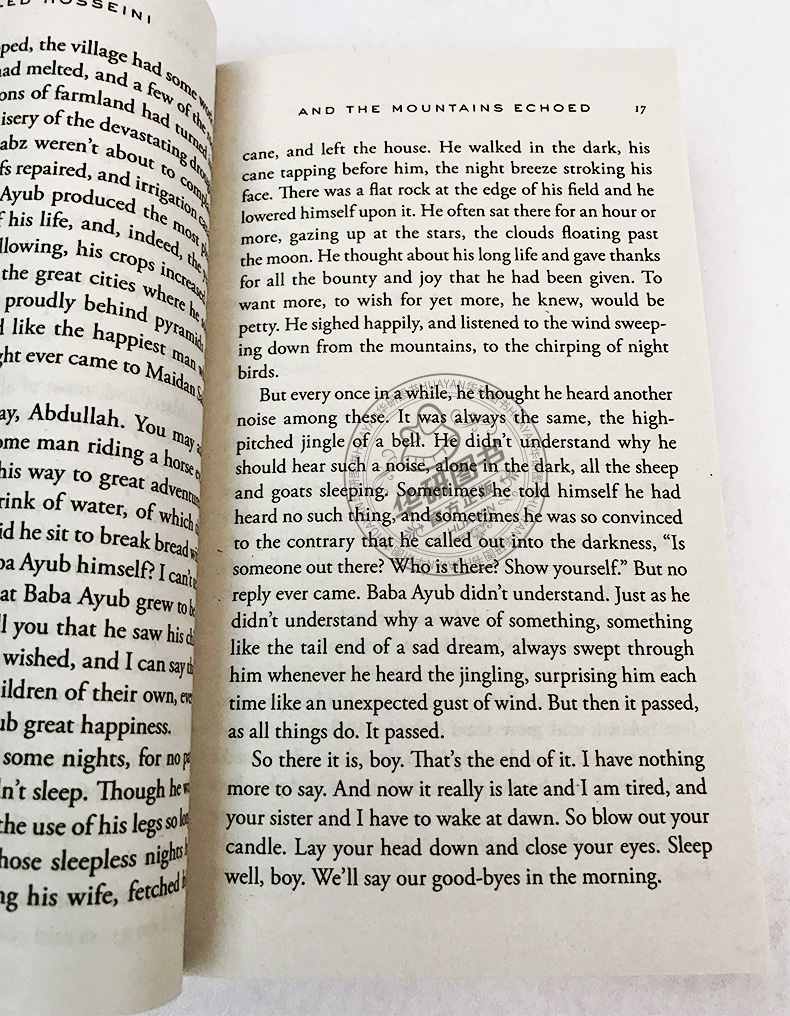
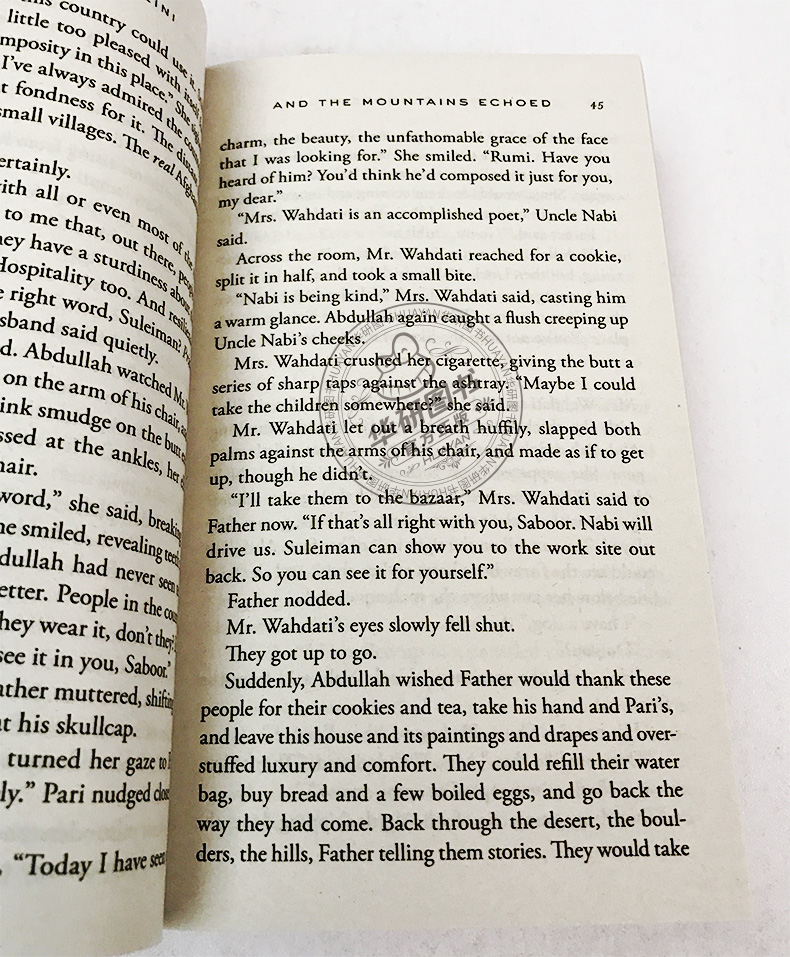
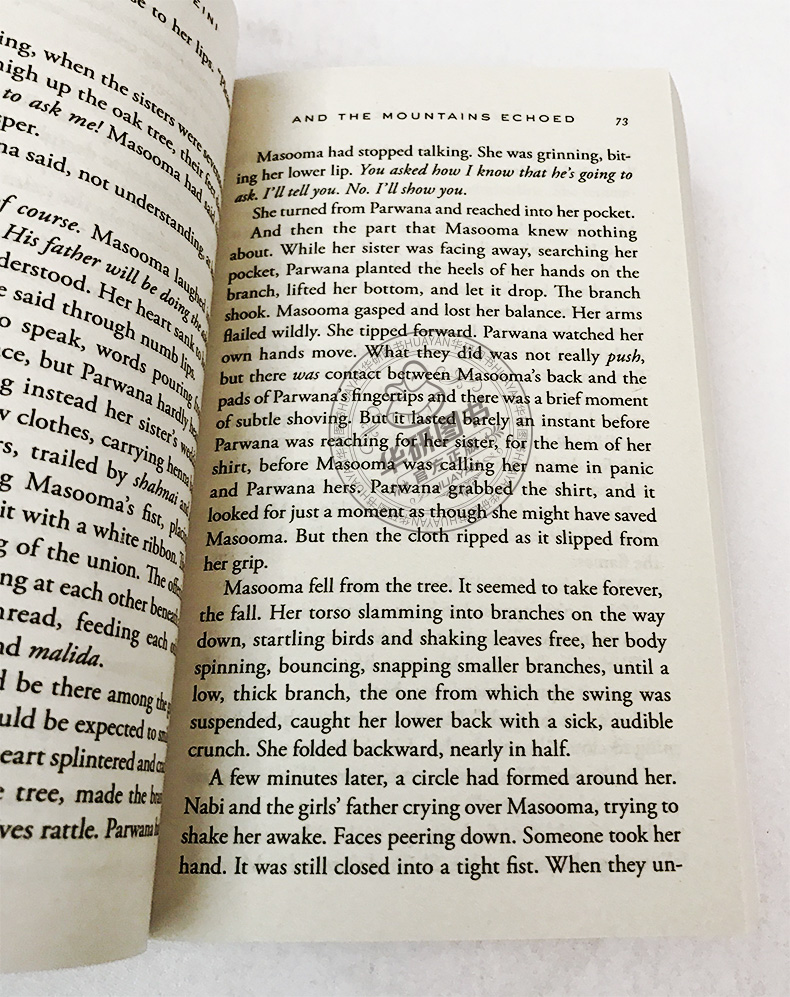

书名:And the Mountains Echoed 群山回唱
作者:Khaled Hosseini卡勒德·胡塞尼
出版社名称:Riverhead Books
出版时间:2014
语种: 英文
ISBN:9781594633102
商品尺寸:10.5 x 2.5 x 17.1 cm
包装:平装
页数:464 (以实物为准)

And the Mountains Echoed《群山回唱》是美籍阿富汗裔作家,The Kite Runner《追风筝的人》作者卡勒德·胡塞尼第三部小说,讲述了一对兄妹因贫穷和战争铸成的六十年悲欢离合。在回答大西洋月刊对他的访问时,卡勒德·胡塞尼这样说道:“《群山回唱》这书的写作始于家庭这概念。事实上,我的写作不断涉及的重要的主题是家庭。抛开了家庭这个线索,你几乎无法理解自己,无法理解周围的人,无法弄明白整个世界中自己的位置。” 本书荣获美国亚马逊书店2013年上半年图书、美国独立书店排行第1、巴诺书店(Barnes & Noble)畅销榜首、书店店员首选推荐上半年度小说、美国国家公共电台(NPR)夏季图书、ABC《早安美国》读书俱乐部夏季图书。 推荐理由: 1. 继《追风筝的人》、《灿烂千阳》后卡勒德·胡赛尼全新力作; 2. 关于背叛、流亡、自我牺牲和亲情力量的传奇; 3.胡赛尼迄今很令人信服、扣人心弦的小说。 媒体评论:“《群山回唱》是胡赛尼信心、在感情上扣人心弦的小说。比《追风筝的人》更流畅、更有野心,叙事上比《灿烂千阳》更精巧。” ——《纽约时报》 “我下决心读《群山回唱》时不要流泪,但我刚看了20页就失败了。等看完最后一页,我号啕大哭。是的,他的新作沉浸在悲伤和绝望当中,当然还有必不可少的一缕偶然而至的希望之光。”——美联社 “《群山回唱》抓住了他早期小说中许多相同的主题:父母与子女间的关系,往事对现实的纠缠,并以同样的兴味描绘出两个世界之间的中间地带,一个是异彩纷呈的寓言的世界,另一个是更模糊,也更为阴暗的现世。胡赛尼先生成功地将书中人物的生活融入了一部感人至深的合唱曲中,这既是他对人物内心生活有深刻了解的证明,同时也是他作为一个老派小说家之实力的确证。” ——《纽约时报》角谷美智子 “《追风筝的人》作者的新书是一部关于牺牲、背叛和亲情力量的传奇。这部小说比《追风筝的人》和《灿烂千阳》更壮阔,它跨越了三代人,将流亡者和救援人员、父母和子女、医生和毒枭的故事相互交织。胡赛尼展示出,人对自己本该守护的东西,会何其轻易地加以恶待和抛弃。但他*终成功彰显了家庭的力量和亲情的永恒。” ——《人物》杂志 “胡赛尼的新作《群山回唱》文笔优美,技巧圆熟,跨越将近60年的阿富汗历史,审视了一次绝望之举给两个幼小生命留下的创痛,它所导致的连串后果。小说虽然充满了令人心痛的悲情,却洋溢着爱的辉光:经久的兄妹之情;龃龉不断却紧密相连的表亲之情;暗自亲昵、终至密友的主仆之情;以至一位医生、一位护士对战争受害者的承诺。为了强调爱的重要与偶然,胡赛尼以一个梦中的场景收尾,回忆往昔,已逝的幸福尤为珍贵,因为我们知道它多么脆弱。” ——《洛杉矶时报》 “《群山回唱》的开篇如雷贯耳。关于爱的局限,胡赛尼提出了许多重要而艰深的问题。他似乎想说,爱是伟大的杠杆,超越语言、阶级和身份。在这部扣人心弦的小说中,无人能够免于爱的冲击。” ——《欧普拉杂志》 An unforgettable novel about finding a lost piece of yourself in someone else. Khaled Hosseini, the #1 New York Times bestselling author ofThe Kite Runner andA Thousand Splendid Suns, has written a new novel about how we love, how we take care of one another, and how the choices we make resonate through generations. In this tale revolving around not just parents and children but brothers and sisters, cousins and caretakers, Hosseini explores the many ways in which families nurture, wound, betray, honor, and sacrifice for one another; and how often we are surprised by the actions of those closest to us, at the times that matter most. Following its characters and the ramifications of their lives and choices and loves around the globe—from Kabul to Paris to San Francisco to the Greek island of Tinos—the story expands gradually outward, becoming more emotionally complex and powerful with each turning page. Review “A story of love, separation, friendship, compassion, exile, memory and the troubled history of Afghanistan, spanning three continents and sixty years... Hosseini is a master storyteller.” —The Times “Hosseini pulls off his usual—impressive—trick of breaking your heart and leaving you smiling.” — The Daily Telegraph “With profound depth and compassion, Hosseini writes about the bonds that define us and shape our lives.” —The Mail on Sunday

一个家庭几代人,因贫穷和战争铸成的六十年悲欢离合。 他们如何去爱,如何被伤害,如何相互背叛与彼此牺牲。 1952年,阿富汗,贫穷的村庄沙德巴格。10岁的男孩阿卜杜拉和3岁的妹妹帕丽经历了一场可能永生难以挽回的骨肉分离。他们的妈妈在生帕丽的时候死于大出血,父亲萨布尔是个卖苦力的老实人,勉强支撑着艰难度日。他无力拉扯两个年幼的孩子,又给孩子们娶了个继母帕尔瓦娜。帕尔瓦娜的哥哥纳比在喀布尔一户富裕人家里做厨子兼司机,女主人妮拉一直无法生育。纳比舅舅居间牵线,帕丽被卖给了妮拉,开始了新生活。 一连串的变故之后,便是一场接一场的战争。苏联人来了,战争爆发了;苏联人走了,军阀们来了;军阀们走了,塔利班来了;塔利班走了,美国人来了。国破家亡,故事的主人公被迫流散,此后的故事将续写于喀布尔、加利福尼亚的圣何塞和法国的巴黎。 So, then. You want a story and I will tell you one... Afghanistan, 1952. Abdullah and his sister Pari live in the small village of Shadbagh. To Abdullah, Pari, as beautiful and sweet-natured as the fairy for which she was named, is everything. More like a parent than a brother, Abdullah will do anything for her, even trading his only pair of shoes for a feather for her treasured collection. Each night they sleep together in their cot, their skulls touching, their limbs tangled. One day the siblings journey across the desert to Kabul with their father. Pari and Abdullah have no sense of the fate that awaits them there, for the event which unfolds will tear their lives apart; sometimes a finger must be cut to save the hand.

卡勒德·胡赛尼(Khaled Hosseini),1965年生于阿富汗喀布尔市,后随父亲迁往美国。毕业于加州大学圣地亚哥医学系,现居加州。著有小说《追风筝的人》(The Kite Runner,2003)、《灿烂千阳》(A Thousand Splendid Suns,2007)、《群山回唱》(And the Mountains Echoed,2013)。作品全球销量超过4000万册。 “立志拂去蒙在阿富汗普通民众面孔的尘灰,将背后灵魂的悸动展示给世人”。2006年,因其作品巨大的国际影响力,胡赛尼获得联合国人道主义奖,并受邀担任联合国难民署亲善大使。他还创立了以自己名字命名的基金会,为阿富汗的难民提供人道主义援助。 With more than ten million copies sold in the United States ofThe Kite Runner andA Thousand Splendid Suns, and more than thirty-eight million copies sold worldwide in more than seventy countries, Khaled Hosseini is one of most widely read and beloved novelists in the entire world.The Kite Runner spent 103 weeks on theNew York Times bestseller list, andA Thousand Splendid Suns debuted as a #1New York Timesbestseller, remaining in the #1 spot for fifteen weeks, and spending nearly an entire year on the bestseller list. Hosseini is a Goodwill Envoy to the United Nations High Commissioner for Refugees, the UN Refugee Agency, and the founder of The Khaled Hosseini Foundation, a nonprofit which provides humanitarian assistance to the people of Afghanistan.

One FALL 1952So, then. You want a story and I will tell you one. But just the one. Don’t either of you ask me for more. It’s late, and we have a long day of travel ahead of us, Pari, you and I. You will need your sleep tonight. And you too, Abdullah. I am counting on you, boy, while your sister and I are away. So is your mother. Now. One story, then. Listen, both of you, listen well. And don’t interrupt. Once upon a time, in the days when divs and jinns and giants roamed the land, there lived a farmer named Baba Ayub. He lived with his family in a little village by the name of Maidan Sabz. Because he had a large family to feed, Baba Ayub saw his days consumed by hard work. Every day, he labored from dawn to sundown, plowing his field and turning the soil and tending to his meager pistachio trees. At any given moment you could spot him in his field, bent at the waist, back as curved as the scythe he swung all day. His hands were always callused, and they often bled, and every night sleep stole him away no sooner than his cheek met the pillow. I will say that, in this regard, he was hardly alone. Life in Maidan Sabz was hard for all its inhabitants. There were other, more fortunate villages to the north, in the valleys, with fruit trees and flowers and pleasant air, and streams that ran with cold, clear water. But Maidan Sabz was a desolate place, and it didn’t resemble in the slightest the image that its name, Field of Green, would have you picture. It sat in a flat, dusty plain ringed by a chain of craggy mountains. The wind was hot, and blew dust in the eyes. Finding water was a daily struggle because the village wells, even the deep ones, often ran low. Yes, there was a river, but the villagers had to endure a half-day walk to reach it, and even then its waters fl owed muddy all year round. Now, after ten years of drought, the river too ran shallow. Let’s just say that people in Maidan Sabz worked twice as hard to eke out half the living. Still, Baba Ayub counted himself among the fortunate because he had a family that he cherished above all things. He loved his wife and never raised his voice to her, much less his hand. He valued her counsel and found genuine pleasure in her companionship. As for children, he was blessed with as many as a hand has fingers, three sons and two daughters, each of whom he loved dearly. His daughters were dutiful and kind and of good character and repute. To his sons he had taught already the value of honesty, courage, friendship, and hard work without complaint. They obeyed him, as good sons must, and helped their father with his crops. Though he loved all of his children, Baba Ayub privately had a unique fondness for one among them, his youngest, Qais, who was three years old. Qais was a little boy with dark blue eyes. He charmed anyone who met him with his devilish laughter. He was also one of those boys so bursting with energy that he drained others of theirs. When he learned to walk, he took such delight in it that he did it all day while he was awake, and then, troublingly, even at night in his sleep. He would sleepwalk out of the family’s mud house and wander off into the moonlit darkness. Naturally, his parents worried. What if he fell into a well, or got lost, or, worst of all, was attacked by one of the creatures lurking the plains at night? They took stabs at many remedies, none of which worked. In the end, the solution Baba Ayub found was a simple one, as the best solutions often are: He removed a tiny bell from around the neck of one of his goats and hung it instead around Qais’s neck. This way, the bell would wake someone if Qais were to rise in the middle of the night. The sleepwalking stopped after a time, but Qais grew attached to the bell and refused to part with it. And so, even though it didn’t serve its original use, the bell remained fastened to the string around the boy’s neck. When Baba Ayub came home after a long day’s work, Qais would run from the house face-first into his father’s belly, the bell jingling with each of his tiny steps. Baba Ayub would lift him up and take him into the house, and Qais would watch with great attention as his father washed up, and then he would sit beside Baba Ayub at suppertime. After they had eaten, Baba Ayub would sip his tea, watching his family, picturing a day when all of his children married and gave him children of their own, when he would be proud patriarch to an even greater brood.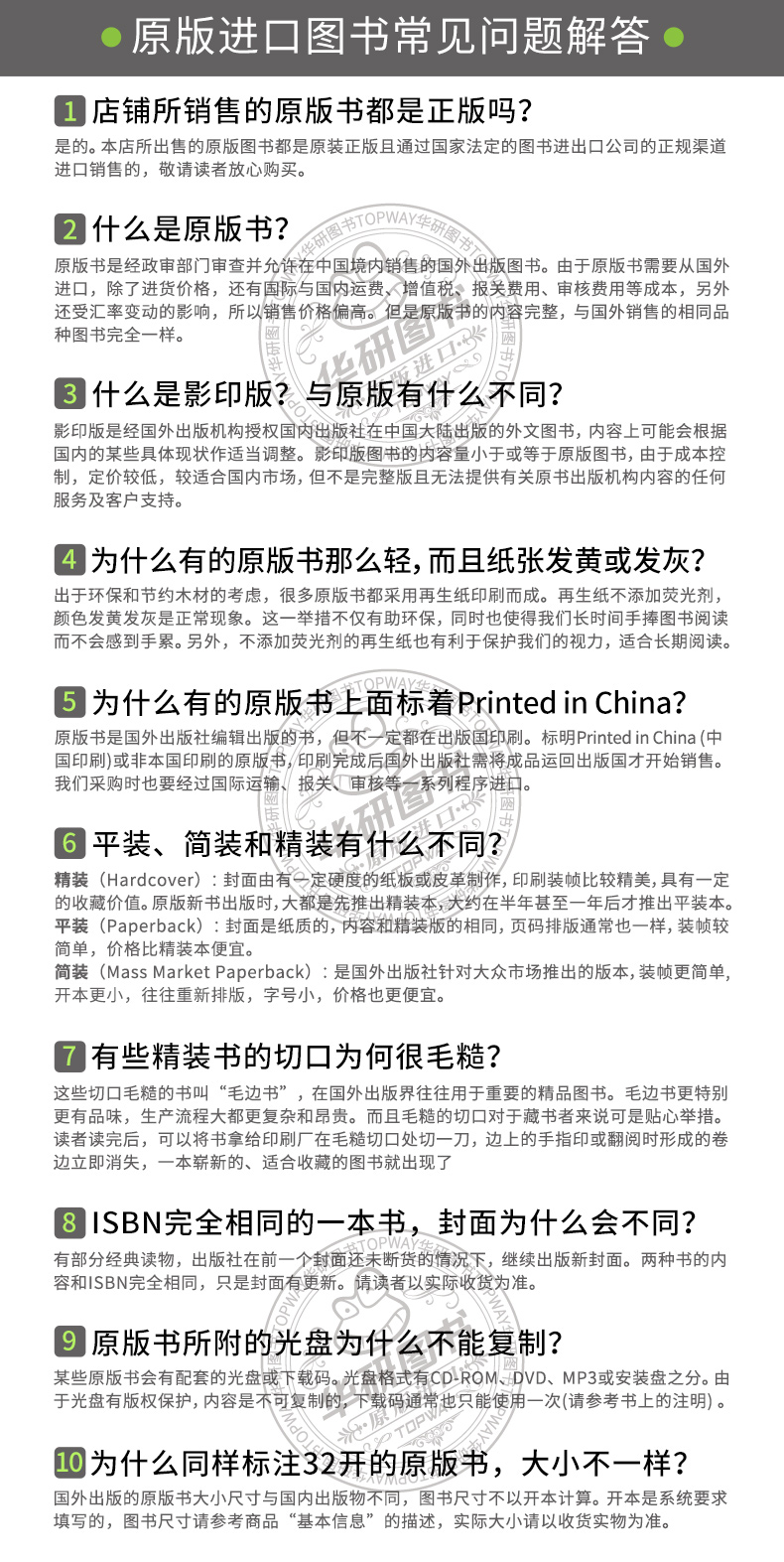
- 华研外语批发分销官方旗舰店 (微信公众号认证)
- 本店是“华研外语”品牌商自营店,全国所有“华研外语”、“华研教育”品牌图书都是我司出版发行的,本店为华研官方源头出货,所有图书均为正规正版,拥有实惠与正版的保障!!!
- 扫描二维码,访问我们的微信店铺
- 随时随地的购物、客服咨询、查询订单和物流...
